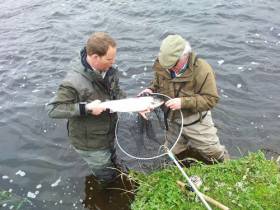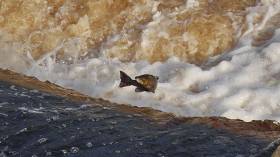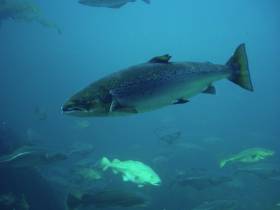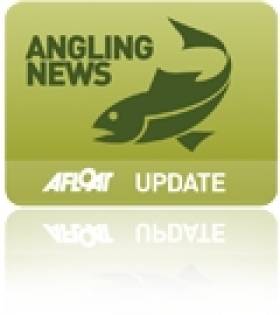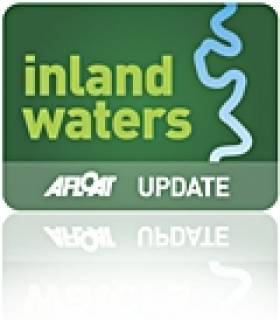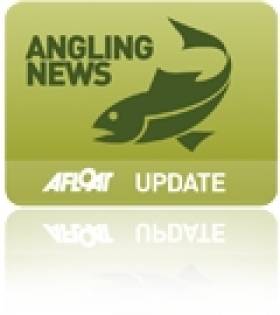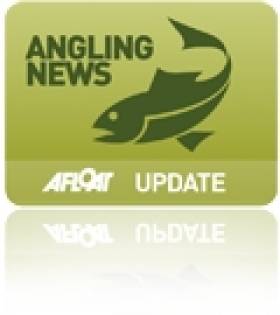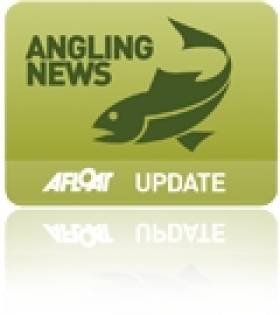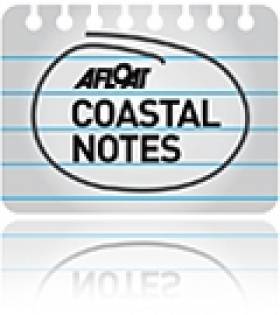Displaying items by tag: Wild Salmon
Wild Salmon & Sea Trout Tagging Scheme (Amendment) Regulations 2017 and Conservation Measures For 2018 Season
#Angling - Sean Kyne, Minister of State at the Department of Communications, Climate Action and Environment, gives statutory notice of his intention to make the Wild Salmon and Sea Trout Tagging Scheme (Amendment) Regulations, 2017 to provide for the management of the wild salmon and sea trout fishery by Inland Fisheries Ireland from 1 January 2018.
A copy of the draft regulations is open for public inspection at the offices of the department in Cavan and also at the offices of Inland Fisheries Ireland.
Any person may submit observations and.or objections to the draft regulations at any time during the period of 30 days concluding Thursday 14 December either by e-mail to [email protected] or to the following address:
Inland Fisheries Division
Department of Communications, Climate Action and Environment,
Elm House,
Earlsvale Road,
Cavan Town
H12 A8H7
Ireland
Tel (01) 6783071 / Lo-call 1890 449900 Ext 3071
Note that rates charged for the use of the 1890 number may vary between service providers.
All submissions received will be published on the department’s website following the conclusion of the consultation period.
Minister Announces New Sea Trout Tagging Scheme & Conservation Measures
#Angling - Sean Kyne TD, Minister of State at the Department of Communications, Climate Action and Environment, has given statutory notice of his intention to make the Wild Salmon and Sea Trout Tagging Scheme Regulations 2016 to provide for the management of the wild salmon and sea trout fishery by Inland Fisheries Ireland from 1 January 2017.
A copy of the draft regulations is available from the department website and and is also open for public inspection at the offices of the department in Cavan and at the offices of Inland Fisheries Ireland.
Any person may submit observations or objections to the draft regulations at any time during the period of 30 days concluding on 11 December 2016 either by e-mail to [email protected] or to the following address:
Inland Fisheries Division,
Department of Communications, Climate Action and Environment,
Elm House,
Earlsvale Road,
Cavan Town
H12 A8H7
Ireland
Tel: 01 6783071 / Lo-call 1890 449 900 Extension 3071
All submissions received will be published on the department's website following the conclusion of the consultation period.
Wild Salmon Now Available From Sustainable Irish Fisheries
#Seafood - Wild Atlantic salmon is now available at fish counters around Ireland.
This salmon comes from sustainably managed traditional net fisheries on estuaries and rivers around Ireland, where the number of returning salmon allows fish to be harvested while maintaining a healthy stock of spawning fish for future generations.
In total, the commercial quota for the wild Atlantic salmon harvest is just 11,131 from a total of 58,599 (angling and commercial combined), which makes it a premium and sought-after product.
Inland Fisheries Ireland (IFI) says wild Irish salmon can be regarded as truly organic, having lived its life in the wild, fed on wild fish and krill, and travelling thousands of miles on its long ocean migration, ensuring firm flesh and high levels of healthy Omega-3 oils.
Salmon conservation measures ensure that only appropriately tagged and recorded wild salmon, commercially caught within the state, may be sold.
As part of the wild salmon and sea trout tagging regulations, all legally caught wild salmon must have a valid gill tag (green in the case of draft net, white in the case of snap net fishing) or tail-tag, in the case of imported wild salmon, before processing, and only authorised dealers or commercial licensed salmon fishermen may sell them. It is not permitted to sell rod caught wild salmon within the state or sell wild salmon without a valid gill or tail tag attached.
Sean Kyne, Minister of State at the Department of Communications, Climate Action and Environment, said: “Wild Atlantic Salmon is a premium product. We all have a duty to ensure that conservation measures continue to be effective. Buying or selling illegally caught salmon jeopardises Ireland’s potential to have a sustainable salmon fishery into the future.”
Farmed salmon and organic farmed salmon is a very different product to wild salmon. Farmed salmon is widely available year round. If consumers have any doubts as to the origin of the salmon, please ask the supplier and help conserve Ireland's wonderful wild salmon resource. Farmed salmon being sold as wild should be reported to the Food Safety Authority. For more information visit www.fisheriesireland.ie.
Draft Wild Salmon & Sea Trout Tagging Regulations Open For Consultation
#Angling - Minister of State at the Department of Communications, Energy and Natural Resources Joe McHugh has given statutory notice of his intention to make the Wild Salmon and Sea Trout Tagging Scheme Regulations 2015.
The new Statutory Instrument will provide for the management of the wild salmon and sea trout fishery by Inland Fisheries Ireland from 1 January 2016.
A copy of the draft regulations is available online and is open for public inspection at the offices of the department in Cavan and also at the offices of Inland Fisheries Ireland.
Any person may submit observations or objections to the draft regulations at any time during the period of 30 days concluding on 10 December 2015 to
Inland Fisheries Division,
Department of Communications Energy and Natural Resources,
Elm House,
Earlsvale Road,
Cavan Town,
H12 A8H7,
Ireland
or by e-mail to [email protected].
All submissions received will be published on the department's website following the conclusion of the consultation period.
For more call 01 678 2117 or Lo-call 1890 44 99 00 (Extension). Rates charged may vary between service providers.
Revised Wild Salmon and Sea Trout Tagging Scheme Regulations In 2015
#Angling - Minister for Natural Resources Alex White has given statutory notice of his proposal to revise the Wild Salmon and Sea Trout Tagging Scheme Regulations to apply from 1 January 2015.
The minister proposes to revoke the existing tagging scheme regulations and to make revised regulations to provide for commercial and angling total allowable catches on an individual river basis.
The draft regulations are available for public inspection HERE.
Any person may submit objections to the draft regulations at any time during the period of 30 days that commenced on Tuesday 11 November 2014 addressed to Inland Fisheries Division, Department of Communications Energy and Natural Resources, Elm House, Earlsvale Road, Cavan or by e-mail to [email protected].
Sea Lice Pose Significant Threat to Wild Salmon Says New Research
#ATLANTIC SALMON - About 39% of salmon mortalities were attributable to the impact of sea lice on wild salmon fisheries, according to a new international study.
The research, published in Proceedings of the Royal Society B, involved experts from Inland Fisheries Ireland collaborating with the Scottish Oceans Institute at the University of St Andrews, the Department of Zoology at the University of Otago in New Zealand, the Atlantic Veterinary College at the University of Prince Edward Island in Canada and the Institute of Marine Research in Norway.
In a statement on the report, IFI says: "In previously published studies, groups of salmon smolts were treated to protect them against sea lice infestation and other groups were untreated and both groups released to sea into 10 areas of Ireland and Norway. A proportion of these released fish were recaptured as adult salmon one or more years later.
"Analysis of the results of all previously published studies together provide experimental evidence from a large marine ecosystem that sea lice can have large impacts on salmon recruitment, fisheries, and conservation. The sea lice were likely acquired during early marine migration in areas with salmon farming, which elevate local abundances of sea lice."
IFI says the results "indicate that parasite-associated mortality may cause the closure of some fisheries when conservation targets of return adult abundances are not being met. However, the implications of these results may be most serious for small populations in small river systems."
The inland fisheries body explains that the high natural mortality rate of both treated and untreated salmon groups was accounted for, which revealed "a large effect of parasites".
"Precisely because natural mortality rates are high, even a proportionally small additive mortality from parasites can amount to a large loss in adult salmon recruitment," it adds.
Minister of State for Natural Resources Fergus O'Dowd welcomed the report, stating: “From the results of this detailed study, it is crucial that sea lice levels are maintained below [designated] protocol levels, particularly in spring when wild salmon smolts are migrating to sea to avoid increased marine mortality.
Minister O'Dowd added that the results of this study "augment our knowledge in the context of proposals for aquaculture development".
The news comes in the wake of IFI's dispute with Bord Iascaigh Mhara over the exclusion of a report critical of the proposed new deep sea wild salmon farm in Galway Bay from the statutory consultation.
The scheme has faced opposition from local salmon anglers who fear the new facility would pose a threat to wild salmon stocks in Irish rivers by increasing the risk of sea lice infection.
Northern Ireland Wild Salmon Stocks 'Around Dodo Levels'
#SALMON THREAT - Just three out of every 100 wild salmon returned to Northern Ireland's rivers last year - prompting concerns that the species has declined past the point of no return, as the Belfast Telegraph reports.
Following a recent meeting of the Stormont culture, arts and leisure committee where the issue was discussed, South Belfast MLA Michael McGimpsey shared his belief "that the public do not appreciate just how precarious the situation is.
"It is estimated that 1,000 to 1,500 salmon return to Northern Ireland each year to spawn. Of these, half are wild salmon and the other half locally hatched salmon.”
McGimpsey said it is "beyond question that there has been a serious collapse in local wild salmon numbers and this is a situation which has implications, not just for local anglers but for our tourist industry."
Claiming that NI's wild salmon stocks are now "around dodo levels", he demanded "totally drastic action in and around salmon" to ensure the species' future.
Earlier this year, as previously reported on Afloat.ie, Northern Ireland's Department of Culture, Arts and Leisure (DCAL) has called for a voluntary ban on offshore salmon fishing.
The move to stop issuing licences for commercial salmon nets that may "contravene European law" off Antrim's north coast was welcomed by river angling campaigners NoSalmonNets, who have been using social media to promote their cause.
Meanwhile, DCAL insists that any court action from salmon netters who may challenge the ban "should not prove an obstacle" to extending the salmon stock preserving measures. Proposals will be put to the minister by the end of this month with a view to enacting legislation next year.
The Belfast Telegraph has more on the story HERE.
Quotas Ensure The Future of Wild Irish Salmon
#ANGLING - Premium wild Irish salmon will soon be available at fish counters around the country - but only thanks to strict conservation measures, says Inland Fisheries Ireland.
The fisheries body announced a quota of less than 17,000 wild salmon that may be caught either commercially or by anglers during this year's season from 12 May to 12 August to ensure their preservation for future generations.
Only authorised dealers or commercial licensed salmon fishermen may sell wild commercially caught salmon, all of which have a green, white or orange tag attached before processing. Those with a blue tag (not commercially caught) or no tag at all may not be sold.
"Wild Irish salmon are organic, a premium product and part of our natural heritage, we all have a duty to ensure their survival," said Minister of State Fergus O'Dowd.
"Buying or selling illegally caught salmon is an environmental crime and jeopardises Ireland's potential to have a sustainable salmon fishery into the future, and it also damages biodiversity."
The IFI also reminds that farmed salmon are a different product, and are widely available year round. Consumers are advised to ask their supplier if they have any doubts as to the origin of their salmon.
Members of the public can also report incidences of illegal fishing or the sale of illegally caught salmon to the IFI at freephone 1890 34 74 24 or for easier recall 1890 FISH 24.
The news comes as voluntary conservation measures are put in place on the Foyle river system in response to a "worrying fall" in adult salmon numbers in Ireland's rivers.
#ANGLING - Voluntary conservation measures have been put in place on the Foyle system for the current angling season to help shore up wild salmon numbers, The Irish Times reports.
The move is in response to a "worrying fall" in the numbers of adult salmon returning to Ireland's rivers this year - and comes just months after wild Atlantic salmon were spotted in the Tolka in Dublin for the first time in nearly 100 years.
These voluntary measures - which involve catch and release, early closure of some club waters and the imposition of sanctuary areas - are intended to reduce the overall salmon catch, thereby encouraging the spawning rate upstream.
The general public have also been asked to assist by not purchasing any wild salmon - and especially those from the Foyle system, as the purchase or sale of such salmon is an offence.
Meeting for Bantry Bay Fish Farm Opponents Tonight
#COASTAL NOTES - Bantry Bay has reached its capacity for salmon farming, says the committee formed to oppose a proposed new facility at Shot Head.
Save Bantry Bay has called a public meeting for supporters tonight (24 March) at Eccles Hotel in Glengarrif, Co Cork, starting at 8.15pm - where chairman Kieran O'Shea will give a presentation on the group's "wide-ranging objections", as The Fish Site reports.
Minister for the Marine Simon Coveney is currently considering the licence application for Marine Harvet's proposed salmon farm at Shot Head in Adrigole.
Concerns among the committee's members include the potential spoiling of the area's natural beauty having a knock-on effect on tourism, and the environmental consequences of algae blooms from nitrogen and phosphorous waste.
Local fisherman fear that a fish farm of more than 100 acres would see the closing off of part of an "important ground for shrimp and prawn".
Possible infection of wild salmon in local river systems by sea lice from farmed salmon is also an issue, with the Environmental Impact Statement for Shot Head highlighting an outbreak of lice at Marine Harvest's facility in Roancarrig two years ago.
The Fish Site has more on the story HERE.
- Coastal Notes
- Fishing
- Bantry Bay
- Co Cork
- fish farm
- salmon farm
- Shot Head
- Adrigole
- Glengarrif
- Eccles Hotel
- Save Bantry Bay
- Minister for the Marine
- Simon Coveney
- Marine Harvest
- tourism
- environment
- algae blooms
- nitrogen
- phosphorous
- waste
- shrimp
- prawn
- infection
- Wild Salmon
- sea lice
- environmental impact statement
- Roancarrigh



























